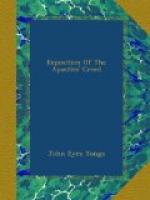The Christian Church is a Catholic Church. The word “Catholic” means universal, and implies that, unlike the Jewish Church, which was narrow and local, requiring admission to earthly citizenship as the condition of receiving spiritual privilege, the Church of Christ is coextensive with humanity, and accessible to all. The Master’s charge was that the Gospel should be preached to every creature. The Church’s field is the world, and her commission sets before her as a duty that she shall go into all the world bearing the glad tidings of salvation. The disciples did not at first realise this comprehensiveness of the new faith. Even after his address on the day of Pentecost, Peter had not risen above his Jewish prejudices. It was not until after he beheld in vision the great sheet let down from heaven, and was forbidden to regard anything which God had cleansed as common or unclean, that the fulness of the Gospel dispensation was understood by him, and he discovered to his astonishment that God is no respecter of persons, but that in every nation he that feareth Him and worketh righteousness is acceptable to Him.[188]
The Catholic Church is One. It is the Holy Catholic Church, one in its origin as the household of God built upon the foundation of the Apostles and Prophets, Jesus Christ being the chief corner-stone;[189] one body, with one hope, one Lord, one faith, one baptism.[190] The distinctive marks of the true Church are allegiance to one Lord, confession of a common creed, and participation in the same Sacraments.
The unity of the Catholic Church is quite compatible with the existence of separate organisations that differ in regard to details of government or worship. There is no outward organisation which possesses a monopoly of Christian truth and privilege. While all who “hold the Head” stand fast in one spirit, they are not all enrolled as members of one ecclesiastical body, or subject to the authority of one earthly ruler. Their citizenship is in heaven; not in Rome or in any city of this world. The claim asserted by the Bishops of Rome to be infallible representatives of Christ and exclusive possessors of the keys of the kingdom of heaven, to whom all men owe allegiance, and whose decrees and discipline cannot be questioned without sin, has no support in Scripture, which, while it enjoins unity of spirit, never prescribes uniformity of organisation.
What the Romanist claims for the Pope is virtually claimed for the Church by some who reject Papal authority. By the Church they mean one visible body of Christians under the same ecclesiastical constitution and government, and they maintain that the right to expound with authority the will of God is vested in this body, and that private judgment must be subordinated to its decisions. To constitute the Church they say there must be bishops at its head, ordained by men whose ecclesiastical orders have come down from apostolic times in unbroken succession. Without this apostolical succession, it is affirmed, there can be no Church, no true ordination, no valid or effectual administration of sacraments.




